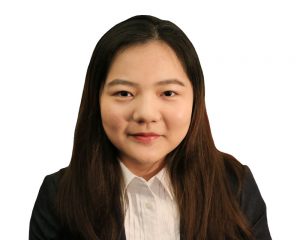Xinyao (Irene) Gu (1T8)
Xinyao (Irene) enjoyed her summer at Hong Kong University of Science and Technology (HKUST). She applied through CIE and was offered to do her eight-week summer research exchange there, working on the treatment of malodorous gases (especially H2S) from wastewater and sludge with the application of hydrogel. These hydrogels contain metabolic inhibitors and biocides which target micro-organisms and bacteria, thus reduce the generation of malodorous gases. In the project, she helped the research group in preparing different types of hydrogel and carrying out site trials at the wastewater treatment plant. They used the data collected to evaluate the performance of hydrogel and continuously improve the gel formula, aiming for higher suppression level and lower expenses while keeping safety in mind. This project is contracted with the Hong Kong government and would be really beneficial to the residents as well as the environment upon successful completion.
Besides her research, she have made a lot of new friends from various parts of the world, and they would travel around the city together during their free time. Although it always took more than an hour to get to the city center from campus, they enjoyed the time on their way talking to each other and sharing their experiences. When the weather was nice, they would go to the beach or go hiking in the mountains. There are so many hiking trails in Hong Kong waiting for people to conquer! These friendships and city explorations definitely added more value to her summer exchange at HKUST.
Going on a summer exchange is a great experience that she would recommend. It gave her an opportunity to broaden her horizons, to experience a different campus life, make new friends and get to know a different culture.
P.S. If you plan to exchange to Hong Kong, one thing she would tell you is: never forget your umbrella when you go out – because the weather report is never accurate!
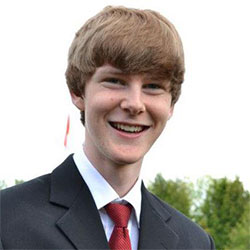
Cullen Adam (1T6)
Adam and several of his classmates spent the summer at the University of Stuttgart in Germany. His project focused on geothermal plants used to extract energy from deep inside the earth for heating or power generation. Specifically, he looked at the impact of freezing on the grout that is used to form a hydraulic seal around the pipes. His insights could increase the efficiency of geothermal heat exchangers and reduce the risk of negatively impacting underground aquifers.
Outside of his research, Adam enjoyed the chance to soak up some of the local culture. “The fact that Stuttgart is pretty central in Europe helps with travelling when I have free time,” he said. “I went to Zermatt in Switzerland, travelling 3,000m above sea level to see the Matterhorn from as close as you can get without climbing it. I found being immersed in this different culture gave greater perspective as an engineer and as a person.”
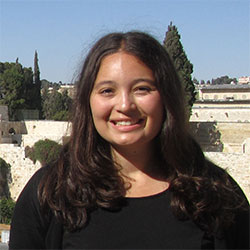 Caroline Brunstein (1T6)
Caroline Brunstein (1T6)
Brunstein had a busy summer. She found the time to complete not one, but two, exchanges. At Lund University in Sweden, she studied the influence of brewing conditions on the flavour characteristics of beer, which she said was just as much fun as it sounds.
“The funniest part was the last day, when I served the beer I made with my laboratory partner to our supervisor,” she said “I was surprised that he had such a sensitive taste to the bitterness.” In addition to sensory analysis — i.e. having people taste it — Brunstein also used liquid chromatography to analyse the levels of flavour-making chemicals in the beer.
Brunstein also had an opportunity to learn about Swedish culture. “Having Fikas (coffee breaks) and celebrating Midsommer (traditional party that marks the beginning of the summer) was so much fun,” she said. “I was also able to travel to five other countries nearby (Denmark, Norway, Hungary, Austria and Czech Republic) during weekends with the friends I made there.”
Following a quick trip home to catch a couple of U2 concerts, Brunstein started her second exchange at the Hebrew University of Jerusalem. She took courses about the challenges of urban planning in a city under conflict, as well as transboundary water cooperation.
“An opportunity to know Israel cannot be simply missed,” she said. “It has such a rich culture and famous touristic attractions. Jerusalem is a sacred city for four of the world’s largest religions and the region has a history of thousands of years. I wanted to see the places mentioned in my high school history classes.”
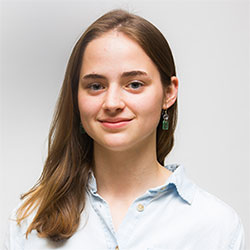 Brittany Green (1T7)
Brittany Green (1T7)
Earlier this summer, Green flew halfway around the world to join an engineering research collaboration in Southeast Asia.
“I wanted to go to a continent I’d never visited and do work at another top university for chemical engineering,” said Green, who just finished six weeks at the National University of Singapore working in a chemical engineering lab.
Green is part of a growing cohort of students using their summers to gain practical research experience. “Summer study abroad programs are becoming more and more popular; they’re growing exponentially,” said Svitlana Frunchak, an exchange officer with the University of Toronto’s Centre for International Experience.
This year, more than 60 U of T Engineering undergraduate students are participating in summer research abroad — the largest group ever and more than double the participants from five years ago.
The rising interest is due in part to the many beneficial aspects of exchanges. In an era of globalization, international experience can provide a strong boost to any resume. Research exchanges, as opposed to course-based exchanges, allow students to work with some of the top experts in a given field. Additionally, there’s the excitement of being able to learn a new language or culture.
A new course, APS 299Y – Summer Research Abroad, is making it easier for engineering students like Green to participate. Pursuing a shorter summer exchange not only allows undergraduates to get hands-on research experience, it also avoids some of the difficulties that come when trying to match specific course requirements at foreign schools during full-year exchanges.
Partner institutions abroad have responded to the popularity of summer exchanges by setting up formal programs. In addition to the National University of Singapore, U of T now has agreements with the Swiss Federal Institute of Technology (ETH-Zurich), Hong Kong University of Science & Technology (HKUST), Technion-Israel Institute of Technology and more than a dozen others.
For Green, the most inspiring part of the experience was seeing the dedication and teamwork of her lab mates. “When one of the members of my lab got published, the whole lab went to celebrate.” she said. She and her colleagues are testing new catalysts that could accomplish chemical transformations — such as those involved in pharmaceutical manufacturing — more quickly
She also enjoyed the opportunities to do some sightseeing. “There was a free music festival last weekend where the performers were young bands from Singapore and Southeast Asia, which was definitely a unique way to experience the culture here,” she said. “I would definitely recommend a research exchange to any student who is able to do one.”
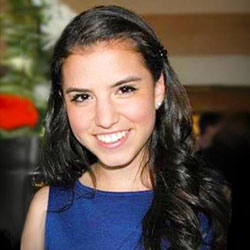 Kayla Musalem (1T5)
Kayla Musalem (1T5)
Musalem spent the summer in England, studying sustainable energy at the University of Liverpool. “I was very excited at the prospect of working in a program in which I could apply my knowledge and gain international research experience,” she said.
Her research project involved modelling the electrical circuits in a solar photovoltaic device designed for use in remote communities. The idea is to use solar power for pumps that can provide water for drinking and agriculture.
Musalem said she enjoyed the chance to travel around the UK in other countries in Europe. “I found it really interesting how excited many people I have met have been to meet a Canadian,” she shared. “They tell you stories about their personal connections to the country; it makes me more proud to be from Canada.”
As for the overall experience, Musalem said she would recommend it to other students. “This exchange has given me the opportunity to work on a project of my own, which helped me to develop skills such as project management, independent work habits, time management, and communication.”
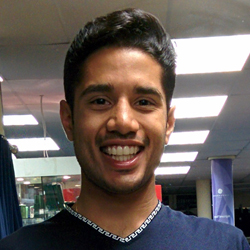 Madhushan Perera (1T6)
Madhushan Perera (1T6)
This summer, through the Centre for International Experience, the Department of Chemical Engineering & Applied Chemistry and the Szymaszek Student Exchange Fund, Perera applied to and was offered a three-month summer research exchange to work at the University of Strathclyde, in Scotland.
“I moved to Glasgow in early June 2015 and the months proved to be an incredible experience that I will never forget,” says Perera. “At the University of Strathclyde, I joined the department of Chemical and Process Engineering, where I was lucky enough to work under the supervision of Dr. Ashleigh Fletcher. My research was focused on the analysis of the kinetics of a carbon capture process. I was given a project that entailed modeling the kinetics, in this case the rate of adsorption, of gaseous carbon onto a uniquely-synthesized porous material. I came to understand how important the knowledge my research is, and how critical it can be for various aspects of the chemical engineering industry, such as the process of separating CO2 from an industrial downstream flue gas line or other purification processes. I knew that my project would have a tangible impact on future research and industrial applications in this field.”
Apart from the research aspect of his exchange, Perera had the opportunity and the privilege to travel throughout the UK and Europe. “Travelling and learning about the history of different places has allowed me to develop as a person and learn things that I would otherwise not have been exposed to. Experiencing the cultures of different cities has given me a greater respect and understanding of the world. It has been a truly humbling and educational experience for me,” says Perera.
